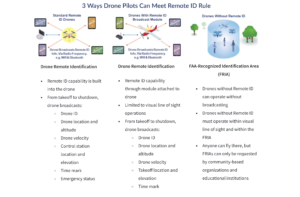The FAA is seemingly hesitant to publish final results of investigations into reckless and/or non-compliant drone investigations.
Without this public knowledge, it’s been very difficult to explain to people why they need to be compliant. “The FAA won’t do anything, so why should I care?” It seems the FAA has listened to a number of us who have asked from some public examples.
On 3/30/22 the FAASTeam sent an email to its Drone Pros, and part of that email was a report on one such infraction.
There is no accompanying article from the FAA on this, so we’re posting the email here. Please share this article with those you’re tying to work with and help them learn there are consequences of not only flying without a 107, but the nature of the flight as well.
Remember, if you’re not flying under the rules of 44809, then it’s automatically a 107 flight, so you can be charged with 107 rules violations, even if you don’t have a Remote Pilot Certificate.
Email:
Recent Drone Enforcement Case
In December 2021, the FAA issued a fine to a drone operator for flying a drone over protest events in upstate New York. The regulations violated by the recreational flyer happened during a series of three separate flights in October and November 2020. The self-proclaimed recreational flyer did not comply with all of the eight requirements listed in section (a) of 49 U.S.C. § 44809 — the exception for limited recreational operations of unmanned aircraft. Section (b) of the statute states when recreational flyers fail to comply with any of the eight limitations contained in section (a), they must comply with the applicable regulations governing the operation of drones. In this case, since the drone was a small unmanned aircraft system (sUAS), 14 CFR part 107 was the applicable regulatory part.
The FAA investigation revealed the flights were over people, at night, in controlled airspace without an authorization, and posed a hazard to people and property below. As a result, the FAA determined the operator of the drone was in noncompliance with section 44809 and therefore subject to 14 CFR part 107.
The following list of regulations were cited in the enforcement case:
1. § 107.12(b): no remote pilot certificate.
2. § 107.13: drone not registered.
3. § 107.19(c): posing a hazard to people, aircraft, or property.
4. § 107.23(a): careless or reckless flying.
5. § 107.29(a): flying at night without a waiver (prior to the new operations over people or at night rule).
6. § 107.39: flying over people without a waiver (prior to the new operations over people or at night rule).
7. § 107.41: flying in controlled airspace without authorization.
8. § 107.65: no 24 month recency of knowledge.
The drone operator was assessed a civil penalty for $15,205 which had to be paid immediately.
This is a great start for educational examples of why someone should fly legally. We hope to see the publication of more public cases too. Publication of the rulings in the Philly DroneLife and Blue Angel cases would be a very good thing to help promote safety.
Please consider joining Drone Service Providers Alliance and help us help you by keeping the skies free from unnecessary regulations at both the federal and state levels.
Sign up for our newsletter and subscribe to our YouTube Channel.


